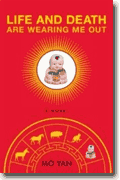Life and Death Are Wearing Me Out
Mo Yan
book reviews:
· general fiction
· chick lit/romance
· sci-fi/fantasy
· graphic novels
· nonfiction
· audio books
· author interviews
· children's books @
curledupkids.com
· DVD reviews @
curledupdvd.com
newsletter
win books
buy online
links
home
for authors
& publishers
for reviewers

 |
Life and Death Are Wearing Me Out Mo Yan Arcade Publishing Hardcover 552 pages March 2008 |
|
Mo Yan is one of China’s most legendary renegade authors and voices of social protest: his work has been banned, pirated, circulated underground, and fortunately translated into English. His novels are primarily social commentary, and Life and Death Are Wearing Me Out
The story is also told by Lan Jiefang, the son of Ximen’s wife and farmhand, born the same day as Ximen the Donkey. Lan is a child of the Revolution and provides a sympathetic human face to balance against Ximen’s forced detachment. As son of the last independent farmer in China (all others have joined the “voluntary” commune), he sees the worst of the Cultural Revolution firsthand. Though rich with soulful scorn for Chinese society and the frailty of human nature, the novel’s most appealing aspect is its over-the-top humor, employing Mo’s characteristic hyberbole, magical realism, and a diction which oscillates between the exotic and the amusingly profane. The world Mo creates is strangely distant but painfully familiar, slapstick but deadly serious—something of Kurt Vonnegut but far more outrageous: “The loudspeakers blared so loud a farmer’s wife had a miscarriage, a pig ran headlong into a wall and knocked itself out, a whole roost of laying hens took to the air, and local dogs barked themselves hoarse.” This humor permeates every level of the narrative, making the novel an absurd and addictive joy to read. But these jokes have barbs: they stem from utmost indignation and condemn every subject they touch. Life and Death Are Wearing Me Out The last third of the novel feels too loose; Mo’s careful management of his huge cast and rumbling, snickering story seem to unravel a little. But I find this forgivable in consideration of the ending, which not only reveals why the King of Hell keeps reincarnating Ximen as animals, but also portrays contemporary China in all its capitalist glory and decadence (Mo is just as harsh on China today as China of the ‘60s). In this section, characters also seem to develop more rounded emotions and personalities, as if they were emerging from a past made mythic by history into a sharply recognizable present. Not only will this console readers who demand more fleshed-out characters, but it also serves as a retrograde reminder that the previous reading is just as real, for all its literary antics. Life and Death Are Wearing Me Out Originally published on Curled Up With A Good Book at www.curledup.com. © Max Falkowitz, 2008 |
|
|
|
 Click here to learn more about this month's sponsor! |
|
| fiction · sf/f · comic books · nonfiction · audio newsletter · free book contest · buy books online review index · links · · authors & publishers reviewers |
|
| site by ELBO Computing Resources, Inc. | |
 For the next fifty years, through various animal reincarnations, Ximen learns what he was guilty of: not ascribing to the cruel hypocrisies and absurd sycophancy of the Communist Party. The human cast lives out China’s fifty-year drama of ascent from agrarian nation to First World industrial juggernaut, which Ximen is condemned to observe from the pained position of an outsider who cannot help the ones he loves, especially when their good souls become warped by the Revolution.
For the next fifty years, through various animal reincarnations, Ximen learns what he was guilty of: not ascribing to the cruel hypocrisies and absurd sycophancy of the Communist Party. The human cast lives out China’s fifty-year drama of ascent from agrarian nation to First World industrial juggernaut, which Ximen is condemned to observe from the pained position of an outsider who cannot help the ones he loves, especially when their good souls become warped by the Revolution.